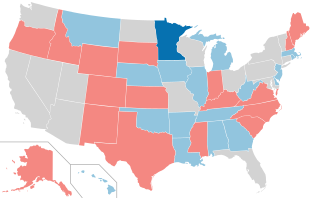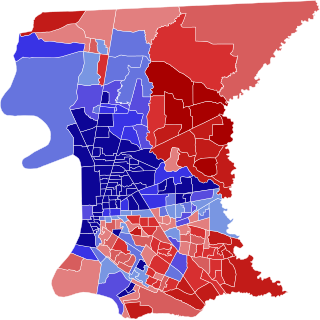
The Conservative Party of New York State is an American political party founded in 1962 following conservative dissatisfaction with the Republican Party in New York. Running on the Conservative Party line, James L. Buckley won election to the U.S. Senate in 1970 and served for one term. Since 2010, the party has held "Row C" on New York ballots—the third-place ballot position, directly below the Democratic and Republican parties—because it received the third-highest number of votes of any political party in the 2010, 2014 and 2018 New York gubernatorial elections. The party is known for its strategy of attempting to influence the Republican Party in a more conservative direction.

The 1990 United States Senate elections were held on Tuesday, November 6, 1990, with the 33 seats of Class 2 contested in regular elections. Special elections were also held to fill vacancies. The Democratic Party increased its majority with a net gain of one seat from the Republican Party. The election cycle took place in the middle of President George H. W. Bush's term, and, as with most other midterm elections, the party not holding the presidency gained seats in Congress. Until 2022, this had been the only election cycle where only one U.S. Senate seat flipped parties.

The 1988 United States Senate elections were elections for the United States Senate. Held on November 8, the 33 seats of Class 1 were contested in regular elections. In spite of the Republican victory by George H. W. Bush in the presidential election, the Democrats gained a net of one seat in the Senate. Seven seats changed parties, with four incumbents being defeated. The Democratic majority in the Senate increased by one to 55–to–45.

The 1986 United States Senate elections were elections for the United States Senate. Held on November 4, in the middle of Ronald Reagan's second presidential term, the 34 seats of Class 3 were contested in regular elections. The Republicans had to defend an unusually large number of freshman Senate incumbents who had been elected on President Ronald Reagan's coattails in 1980. Democrats won a net of eight seats, defeating seven freshman incumbents, picking up two Republican-held open seats, and regaining control of the Senate for the first time since January 1981. This remains the most recent midterm election cycle in which the sitting president's party suffered net losses while still flipping a Senate seat.

The 1984 United States Senate elections were held on November 6, with the 33 seats of Class 2 contested in regular elections. They coincided with the landslide re-election of President Ronald Reagan in the presidential election. In spite of the lopsided presidential race, Reagan's Republican Party suffered a net loss of two Senate seats to the Democrats, although it retained control of the Senate with a reduced 53–47 majority. Democrats defeated incumbents in Illinois and Iowa, and won an open seat in Tennessee, while Republicans defeated an incumbent in Kentucky.

The 1952 United States Senate elections was an election for the United States Senate which coincided with the election of Dwight D. Eisenhower to the presidency by a large margin. The 32 Senate seats of Class 1 were contested in regular elections, and three special elections were held to fill vacancies. The Republicans took control of the Senate by managing to make a net gain of two seats. However, Wayne Morse (R-OR) became an independent forcing Republicans to rely on Vice President Richard Nixon's tie-breaking vote, although Republicans maintained a 48–47–1 plurality. Throughout the next Congress, Republicans were able to restore their 49–46–1 majority. This was the third time, as well as second consecutive, in which a sitting Senate leader lost his seat.

The 1932 United States Senate elections coincided with Democrat Franklin D. Roosevelt's landslide victory over incumbent Herbert Hoover in the presidential election. The 32 seats of Class 3 were contested in regular elections, and special elections were held to fill vacancies.

The 1846–47 United States House of Representatives elections were held on various dates in various states between August 2, 1846, and November 2, 1847. Each state set its own date for its elections to the House of Representatives. 228 elected members representing 29 states took their seats when the first session of the 30th United States Congress convened December 6, 1847. The new states of Iowa and Texas elected their first representatives during this election cycle. These elections were held during President James K. Polk's term.

The 2008 United States Senate election in Texas was held on November 4, 2008. Incumbent Republican John Cornyn defeated Democratic nominee Rick Noriega, a member of the Texas House of Representatives, to win re-election to a second term in office.

The 2002 United States elections were held on November 5, in the middle of Republican President George W. Bush's first term. Republicans won unified control of Congress, picking up seats in both chambers of Congress, making Bush the first President since Franklin D. Roosevelt in 1934 to gain seats in both houses of Congress. In the gubernatorial elections, Democrats won a net gain of one seat. The elections were held just a little under fourteen months after the September 11 attacks. Thus, the elections were heavily overshadowed by the War on Terror.

The 1976 United States Senate election in Florida was held on November 2, 1976. Incumbent Democratic U.S. Senator Lawton Chiles won re-election to a second term.

Randall Keith Weber is an American businessman and politician who has represented Texas's 14th congressional district in the United States House of Representatives since 2013. He was previously a member of the Texas House of Representatives, representing the 29th district. He is a member of the Republican Party.

The 1940 United States Senate election in Ohio took place on November 5, 1940. Incumbent Democratic Senator Vic Donahey did not run for re-election to a second term. In the open race to succeed him, Republican Mayor of Cleveland Harold Hitz Burton defeated Democratic U.S. Representative John McSweeney.

The 2020 United States House of Representatives elections in Ohio were held on November 3, 2020, to elect the 16 U.S. representatives from the state of Ohio, one from each of the state's 16 congressional districts. The elections coincided with the 2020 U.S. presidential election, as well as other elections to the House of Representatives, elections to the United States Senate and various state and local elections. Primaries were held on April 28, 2020.
Boston City Council elections were held on November 6, 2001. Nine seats were contested in the general election, as the incumbents for districts 1, 5, 8, and 9 ran unopposed. Two seats had also been contested in the preliminary election held on September 25, 2001.

The 2021 Cleveland mayoral election took place on November 2, 2021, to elect the Mayor of Cleveland, Ohio. The election was officially nonpartisan, with the top two candidates from the September 14 primary election advancing to the general election, regardless of party. Incumbent Democratic Mayor Frank G. Jackson was eligible to run for reelection to a fifth term, but instead chose to retire. Justin Bibb was elected the 58th mayor of Cleveland in the general election.

The 2020 Baton Rouge mayoral election was held on November 3, 2020 and December 5, 2020 to elect the mayor-president of Baton Rouge, Louisiana.

Elections are currently held every four years to elect the mayor of Hartford, Connecticut.

Elections are held in Providence, Rhode Island to elect the city's mayor. Such elections are regularly scheduled to be held in United States midterm election years.

The 2021 Cleveland City Council election was held on November 2, 2021. The primary elections were held on September 14, 2021. All 17 seats on Cleveland City Council were up for election for four-year terms. Elections in Cleveland are officially nonpartisan, with the top two candidates from the primary election advancing to the general election, regardless of party.





















